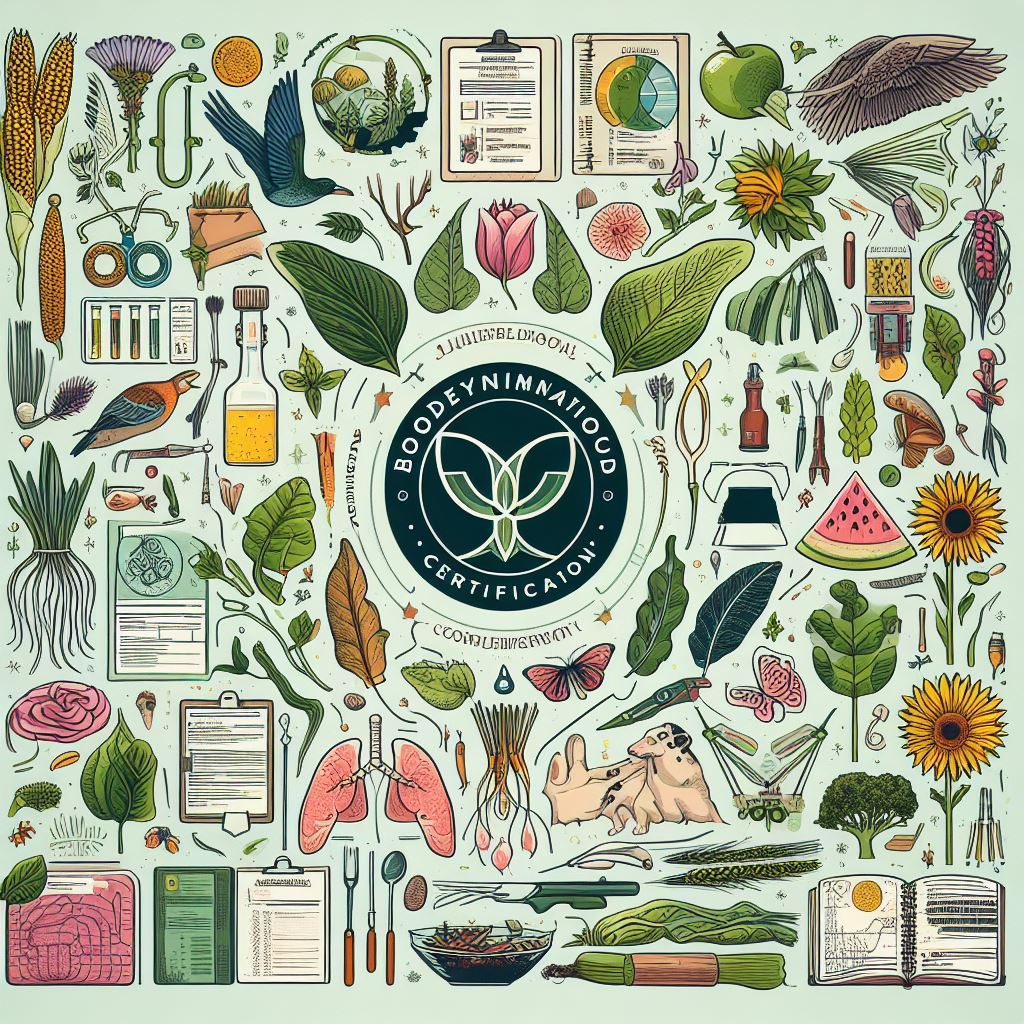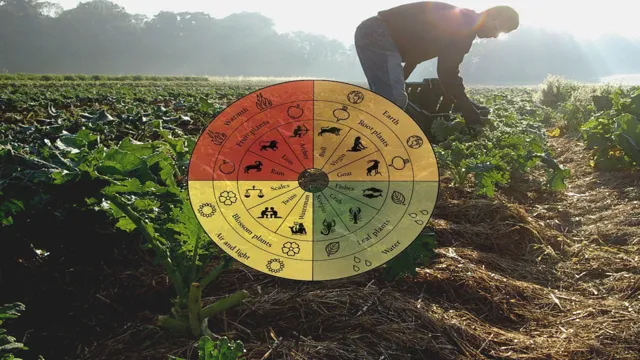Immerse yourself in the fascinating world of biodynamic agriculture with our deep dive into the most powerful tools for biodynamic certification. In this comprehensive guide, we’ll unravel the complexities of this unique farming method, and provide insights into how you can leverage these tools to ensure the health and vitality of your farm, and the integrity of your produce. As consumers are becoming increasingly conscious of the origins of their food, biodynamic farming stands out as a beacon of sustainability and ethical practice.
Discover how these certification tools can revolutionize your farming practices and take your produce to the next level.

Understanding Biodynamics
Biodynamics: A Deeper Dive into Certification Tools The agricultural world is a vast tapestry of methods and philosophies, each with its unique approach to nurturing and harvesting the Earth’s bounty. Among these, biodynamics stands out for its holistic, ecological, and ethical approach to farming. At the heart of its practice is the use of biodynamic certification tools, instruments that ensure the integrity and authenticity of biodynamic products.
Biodynamic certification tools are not your ordinary farming tools. They are the touchstones that guide farmers on their journey toward sustainable and responsible farming. These tools include, among others, the Demeter Biodynamic Farm Standard and the Stellar Certification Services, both of which uphold the stringent principles of biodynamics.
The Demeter Biodynamic Farm Standard, for instance, is a comprehensive set of guidelines that cover all aspects of farm management, from soil fertility to animal welfare. It is a roadmap that leads farmers towards a harmonious balance with nature. On the other hand, Stellar Certification Services provides an added layer of assurance.
They conduct rigorous inspections and reviews to verify that farms are complying with biodynamic standards. However, these biodynamic certification tools aren’t just about rules and regulations. They embody a philosophy that views agriculture as a living, interconnected system.
They encourage farmers to treat their farms as self-sustaining organisms, where each element–from the soil to the insects to the livestock–plays a vital role. So, while biodynamic certification tools may seem complex and daunting, they are, in essence, guides to a more harmonious and sustainable way of farming. They are the compasses that steer farmers towards a future where agriculture doesn’t just take from the Earth, but gives back in abundance.
Basics of Biodynamic Agriculture
Delving into the fascinating world of biodynamic agriculture, one cannot overlook the significance of biodynamic certification tools. These tools serve as the cornerstone in adhering to the stringent standards of this holistic and ecological approach to farming. They guide farmers to create self-sustained ecosystems, enhance soil fertility, and nurture plant growth in a sustainable and ethical manner.
These tools are not mere gadgets, they signify a commitment to a dynamic agricultural philosophy that respects nature’s rhythms, and the vitality of the earth. So, let’s embark on this enlightening journey, and explore the foundational elements of biodynamic agriculture.

Benefits of Biodynamic Practices
Embracing biodynamic practices can yield a plethora of benefits. Biodynamic certification tools not only ensure the health of our ecosystem but also enhance crop quality and yield. By harnessing the power of nature, these practices foster soil fertility, biodiversity, and sustainable growth.
The biodynamic approach is more than just a farming method; it’s a holistic philosophy that intertwines agriculture, food production, and environmental stewardship. So, let’s dive into the world of biodynamics and explore how it’s transforming the agricultural landscape, one farm at a time.
Biodynamic Certification Process
The Biodynamic Certification Process: Unearthing the Secrets of Biodynamic Certification Tools Biodynamic farming, a mystical blend of agriculture, astrology, and spiritual philosophy, is gaining ground among farmers and wine producers worldwide. At the heart of this trend is the biodynamic certification process, a rigorous, standardized program that verifies a farm’s adherence to biodynamic principles. But what are the tools that make this certification possible? Let’s delve into the world of biodynamic certification tools, those essential instruments that ensure the integrity of the biodynamic farming process.
These tools, both tangible and intangible, range from the innocuous cow horn (used in the preparation of biodynamic compost) to the astrological calendar, which guides the timing of planting and harvesting. The biodynamic certification process is a testament to the dedication, patience, and belief in a farming philosophy that respects the earth and its natural rhythms. The tools used in this process are not just farming implements, but symbols of a holistic approach to agriculture that values sustainability, biodiversity, and soil health.
So the next time you come across a biodynamic farm or savor a glass of biodynamic wine, remember the rigorous certification process behind it. Those cow horns and astrological calendars are not just quirky farming practices, but essential tools in the production of food and drink that is as good for the earth as it is for the palate.
Eligibility and Requirements
Navigating through the intricacies of biodynamic certification can be quite a task. However, with the right tools, it can turn into a rewarding venture. Biodynamic certification tools are vital in ensuring that your agricultural practices adhere to the stringent conditions required for this certification.
Whether you’re a seasoned farmer or a novice green thumb, understanding the eligibility and requirements is key in your journey. From the soil’s health to the biodiversity of your farm, these tools assess various aspects to guarantee your farm’s sustainability and productivity. So, let’s delve into the specifics of these indispensable biodynamic allies.
Steps to Certification
Embarking on the journey to achieve biodynamic certification can seem like a daunting task. However, with the right tools and guidance, it can be a rewarding endeavor. The first step is understanding the principles of biodynamic farming, a holistic approach that views the farm as a self-sustaining ecosystem.
Next, you’ll need to familiarize yourself with the certification standards set by the Demeter Association, the primary certifying body for biodynamic farming. Following that, you’ll need to implement these standards on your farm, using various biodynamic certification tools like soil preparation methods and pest management techniques. Lastly, you’ll submit your farm for evaluation and await your certification.
Maintaining Certification Status
Maintaining your biodynamic certification status can be a challenging task, yet it’s absolutely necessary to ensure the credibility and integrity of your farming practices. One way to streamline the certification process is by leveraging the power of biodynamic certification tools. These smart platforms not only simplify the process but also provide a transparent, effective and efficient way of managing all the crucial aspects related to certification.
The tools are ingeniously designed to keep you updated, organized and compliant, thereby making the daunting task of maintaining certification status less intimidating and more manageable.
Essential Tools for Biodynamic Certification
Securing a biodynamic certification is not a walk in the park; it requires meticulous effort and the right set of tools. This pursuit is akin to a gardener’s labor, where the outcome is only as good as the tools and methods used. As such, let’s delve into the essential tools needed to navigate this biodynamic certification journey seamlessly.
First on the list are soil testing kits. These kits are crucial for determining soil health, which is a significant factor in biodynamic farming. They reveal valuable information such as pH levels, nutrient content, and moisture levels, setting the stage for the cultivation of healthy crops.
Next, we have composting materials. Composting is a significant aspect of biodynamic farming, and having the right materials is essential. These may include organic waste like plant residues, animal manure, and even kitchen scraps.
The compost produced contributes to soil fertility and crop health, bringing you a step closer to certification. Another indispensable tool is a biodynamic calendar. This calendar, based on lunar and astrological cycles, is used to guide planting, cultivating, and harvesting processes.
It’s not your typical wall-hanging calendar, but a crucial tool that aligns farming activities with natural rhythms. Finally, we have biodynamic preparations – a set of nine natural substances used in homeopathic quantities to enhance soil quality and stimulate plant life. These preparations, when correctly used, can significantly improve your farm’s vitality, bringing you closer to achieving your biodynamic certification.
In conclusion, the journey to biodynamic certification is a meticulous process that demands the right set of tools. However, with soil testing kits, composting materials, a biodynamic calendar, and biodynamic preparations at your disposal, you’re well-equipped to navigate this journey.
Biodynamic Preparations
“Diving into the world of biodynamic farming, one cannot overlook the significance of biodynamic preparations – the distinctive biodynamic certification tools. These are not just ordinary farming provisions; they are the magical potions that transform ordinary farming into a sustainable, environment-friendly practice. Crafted from a blend of natural materials and nurtured by the rhythms of nature, these preparations are applied to the soil, plants, and compost, enhancing the vitality of the farm.
They are the unsung heroes, fostering biodiversity, soil fertility and stimulating plant growth, all while preserving our planet. Indeed, these tools are the essence of biodynamic farming, making it a truly green endeavor.”
Soil Testing Equipment
In the realm of sustainable agriculture, biodynamic certification tools are a game-changer. These sophisticated soil testing devices help farmers ensure the health and vitality of their land, paving the way for more productive and eco-friendly farming practices. From nutrient analyzers that detect soil composition to moisture meters that prevent overwatering, these tools are instrumental in achieving and maintaining biodynamic certification.
So, whether you’re an experienced farmer or a green-thumbed novice, these tools can provide crucial insights into your soil’s health, ensuring your crops thrive and your farm stays sustainable.

Resources for Biodynamic Certification
Securing Biodynamic Certification: The Essential Tools You Need Navigating the path to obtaining biodynamic certification can seem like traversing a labyrinth without a map. However, with the right resources at your disposal, the journey can be less daunting and more structured. As a farmer or agricultural business owner, understanding the complexities of the certification process and having the correct biodynamic certification tools at your fingertips is paramount.
Firstly, equip yourself with knowledge. Understand the principles of biodynamic farming, which go beyond organic farming practices to consider the farm as a living organism in its own right. Informational resources, such as the Demeter Association’s Farm Standard, can provide invaluable insights into the intricate details of biodynamic farming.
Next, invest in quality biodynamic preparations and composts, which are fundamental to the biodynamic farming methods. These preparations, made from manure, herbs, and mineral substances, are used to enhance the soil’s quality and stimulate plant life. Another key resource is expert consultancy.
Experienced biodynamic consultants can offer practical advice, helping you implement biodynamic practices effectively while adhering to certification standards. They can provide guidance on soil fertility, crop rotation, animal husbandry, and the application of biodynamic preparations. Lastly, remember the importance of community involvement.
Joining biodynamic farming groups and forums can provide you with a support network of like-minded individuals. They can share their experiences, provide advice, and offer moral support when challenges arise. In sum, the road to biodynamic certification may be winding, but with the right tools – knowledge, quality preparations, expert advice, and a supportive community – the journey can be a fulfilling and rewarding endeavor.
Key Online Platforms
Navigating the World of Biodynamic Certification Tools: Key Online Platforms You Should Know In the ever-evolving realm of sustainable agriculture, a new buzzword has emerged – biodynamic farming. But how can you ensure the credibility of your biodynamic practices? Enter biodynamic certification tools, your digital companions in authenticating your agricultural methods. These online platforms offer a comprehensive suite of services, from tracking soil health to managing livestock, all aimed at helping you achieve and maintain that coveted biodynamic certification.
With their help, you can not only validate your farming processes, but also join the league of farmers making strides towards a more sustainable future.
Recommended Reading Material
In our quest to demystify the world of biodynamic agriculture, we have curated a selection of must-read materials. These resources not only provide comprehensive insights into the principles and practices of biodynamics but also offer an in-depth understanding of biodynamic certification tools. Armed with this knowledge, you can confidently navigate the intriguing landscape of this sustainable farming method.
From spellbinding books to enlightening articles, we have something for everyone. So, sit back, grab a cup of your favorite brew, and dive into the fascinating world of biodynamics. Enjoy the read!
Conclusion
Biodynamic certification tools are more than just instruments for ensuring an agricultural practice meets certain standards. They are like the Sherlock Holmes of farming, intelligently deciphering the complex relationships between soil, plants, and animals. They ensure that the ecosystem is in harmony, that the farm is a living organism in its own right, and that agricultural practices are not just sustainable, but regenerative.
Frequently Asked Questions (FAQs)
What are biodynamic certification tools?
Biodynamic certification tools are various methods and standards used to verify that a farm or product meets the specific requirements for biodynamic certification. These tools may include soil testing, farm inspection, and review of farm management practices.
Why are biodynamic certification tools important?
Biodynamic certification tools are significant as they ensure that the principles of biodynamic farming, such as ecological self-sufficiency, biodiversity, and soil health, are being adhered to. This helps consumers make informed choices about the products they buy and promotes sustainable farming practices.
What is the process of obtaining a biodynamic certification?
The process of obtaining a biodynamic certification involves a thorough review of the farm’s practices and soil health using specialized tools. This includes a detailed examination of the farm’s management plan, soil testing, and an on-site inspection by a certified biodynamic inspector.
How reliable are biodynamic certification tools?
Biodynamic certification tools are considered highly reliable. They are based on stringent standards set by biodynamic farming organizations and are carried out by trained and certified inspectors. However, as with any certification process, the reliability ultimately depends on the honesty and integrity of the farmers and inspectors involved.
Can any farm become biodynamically certified?
Any farm can work towards becoming biodynamically certified. However, it requires a commitment to biodynamic principles, including biodiversity, ecological self-sufficiency, and soil health. The certification process involves a thorough review of the farm’s practices and an on-site inspection, using biodynamic certification tools.
What are some examples of biodynamic certification tools?
Examples of biodynamic certification tools include comprehensive farm management plans, soil testing kits, and checklists for inspecting various aspects of the farm, including crop health, livestock care, and biodiversity. The exact tools used may vary depending on the specific certification body and the size and type of farm being inspected.

Leave a Reply